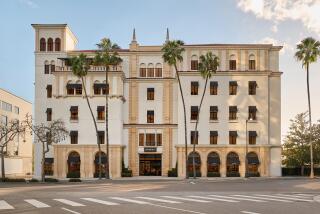It’s a Buyer’s Market in Retailing as More Top Chains Hit the Block
- Share via
BAT Industries’ decision to sell Saks Fifth Avenue and Marshall Field’s, two of the nation’s most venerable chains, threw an already agitated retailing world further into a frenzy Tuesday.
“Everything is for sale in retailing right now,” said Walter F. Loeb, a retail analyst at the Morgan Stanley & Co. brokerage in New York. “There’s so much available . . . that it has become a buyer’s market.”
Indeed, especially in New York--where Bloomingdale’s recently went on the block--it would seem that merchants themselves could be the biggest bargains around this holiday season. As a result, those suppliers, sales associates and executives who weathered the industry’s wave of consolidation in the past few years are bracing for more upheaval.
BAT maintains staunchly that New York-based Saks, one of the nation’s premiere fashion specialty retailers, and Marshall Field’s, the 130-year-old leader in Chicago, will not be unloaded in a fire sale.
Some in Distress
Nor, BAT said, will it rush to sell Breuners, a chain based in San Ramon, Calif., with 17 home-furnishing retail stores and 44 furniture rental locations, and the Ivey’s department store chain, headquartered in Charlotte, N.C., with 23 stores in the Southeast. Those chains are also for sale under the overhaul plan announced Tuesday.
Clearly, BAT is not in the same boat as Campeau Corp., which recently announced its intention to sell Bloomingdale’s, its crown jewel, to raise some quick cash. Also in distress is L. J. Hooker, the owner of Bonwit Teller and B. Altman, which in August filed for protection from creditors under Chapter 11 of the U.S. Bankruptcy Code.
BAT, on the other hand, is selling off the retail properties to thwart Sir James Goldsmith’s hostile takeover bid rather than to address cash-crunch problems. Nevertheless, it could have asked for better timing to avoid such a crowded field.
“We feel . . . that in the absence of the urgency of a distress sale and given the quality of these franchises, we can take the necessary time to find a good strategic buyer at the right price,” said Arthur C. Martinez, senior vice president of Batus Inc., the U.S. arm of BAT Industries, and group executive for all the company’s retailing properties.
“It is not a fire sale by any stretch of the imagination. BAT wants to get on with it, but in an orderly, disciplined way.”
Prestigious Names
Noting that Saks and Field’s between them have more than 18,000 employees, Martinez said the company is “concerned” about their interests and expects to hold out, possibly until the end of next year, to find the right buyers.
“We are certainly going to be looking for a buyer dedicated to continuing to build the businesses. We’re not looking for a buyer who would disassemble or dismember them.”
Late Tuesday, Field’s Chairman and Chief Executive Philip B. Miller made public his intention “to make an aggressive buyout offer” for the 25-store chain. And Martinez said the management of Saks Fifth Avenue has also expressed preliminary interest in a buyout.
In Saks and Field’s, BAT has two of the best known names in retailing. However, despite hefty investments in recent years and some recent improvements, the two chains have had mediocre profit records.
Saks, with 46 stores in 18 states (including nine in California), had sales of nearly $1.2 billion in 1988. The chain, which has about 10,000 employees, is undergoing a $360-million renovation and expansion program. Profits last year were $95 million, compared to about $17 million when BAT bought the chain about 15 years ago, when it had 32 stores, Martinez said.
Field’s, with 25 stores in Illinois, Ohio, Wisconsin and Texas, had sales of just over $1 billion in 1988 and profit of $83 million. That compares to the $46-million profit Field’s had in 1982, when BAT, as a “white knight,” bought the chain to block an unfriendly offer by raider Carl Icahn.
Field’s flagship store on State Street in Chicago is in the midst of a $110-million restoration.
As for potential buyers for the BAT properties, William N. Smith, an analyst with the Smith Barney, Harris Upham brokerage in New York, suggested that May Department Stores, owner of May Co. California and Robinson’s, and Dillard Department Stores would be interested in Field’s. But Saks, he said, is not “a direct fit with any American department store retailer.”
All of the turmoil in retailing has some observers concerned that merchants will pay more attention to selling themselves than to selling merchandise.
“If (retailers) are concentrating on selling their stores, they’re not concentrating on running them,” said Marjorie S. Deane, chief executive of Tobe Associates, a fashion and retail consulting firm in New York.
More to Read
Inside the business of entertainment
The Wide Shot brings you news, analysis and insights on everything from streaming wars to production — and what it all means for the future.
You may occasionally receive promotional content from the Los Angeles Times.











